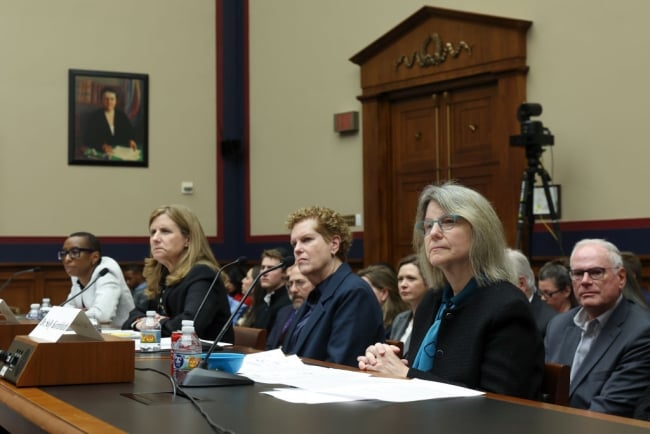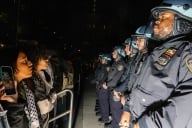You have /5 articles left.
Sign up for a free account or log in.

Kevin Dietsch/Staff/Getty Images North America/Getty Images
Recent events in the Middle East have “scrambled campus politics,” says David Leonhardt. That is true in the sense that the culture warriors defending the speech rights of bigots now demand universities discipline the speech of those in solidarity with Palestinians. But the inconsistency is itself consistent. Recall the proposals circa 2017–18 for laws to protect campus speech that by 2020 had become legislation to prohibit it (the divisive concepts bills). Attempting to discern steadfast principles in the new right’s movement is futile, because its goal is first and foremost simply to stay in motion.
What we are witnessing is not so much the scrambling of the culture wars as a new stage of them. The talking points adapt, drawing on whatever currently captures the public imagination—or can be made to capture it—in the service of a movement that delivers real rewards to those who participate. For the movement’s leaders, rewards include winning local elections, appointments to the presidencies of Florida colleges, teaching gigs in the conservative centers being set up at universities, fellowships with think tanks and quasi-university institutes, and, of course, potential posts in a 2025 Trump administration. For the foot soldiers of the movement, whose participation largely consists of replying enthusiastically to Christopher Rufo’s X stream, there are the compensatory rewards of feelings of affirmation and belonging.
In the preceding stage, those of us in higher education—faculty, administrators and staff alike, particularly but not only at public institutions—were put on notice that our jobs are deeply insecure. In my essay for Academe, “Subnational Authoritarianism and the Campaign to Control Higher Education,” I provided an overview of the most spectacular feature of this first stage—the ever-proliferating educational censorship bills of the last state legislature sessions—and offered four takeaways.
- The laws are vague and confusing, precisely the kinds of laws that historically have been most effective in creating a chilling climate.
- The bills disproportionately target the scholarship of, and job security of, scholars of color and LGBTQ faculty members.
- Proposed in the name of democracy—that is, a claim that elected officials have a kind of mandate to “course correct” higher education—the bills do not actually reflect the sentiments of all Americans but rather a subset of those in one political party.
- “Carrots” in the form of infusions of money to create conservative centers on campuses and programming around “civil discourse” constitute a parallel plank deserving as much attention as the “sticks” of defunding, bans and prohibitions.
We have not seen the end of legislative efforts to crush academic freedom. As Jeffrey Adam Sachs and Jeremy C. Young write, despite “some major defeats and embarrassing setbacks” in the last round of sessions, the supporters of educational censorship bills “have not given up. On the contrary.”
The American Association of University Professors released a report, “Political Interference and Academic Freedom in Florida’s Public Higher Education System,” last month, the results of a months-long investigation of higher education in Florida. “What we are witnessing in Florida is an intellectual reign of terror,” says a professor at Florida A&M University interviewed by the investigating committee. “There is a tremendous sense of dread right now, not just among faculty; it’s tangible among students and staff as well.”
The report outlines the takeover of New College of Florida, clearly chosen for the relative ease with which it could be wholly transformed into a tool of intimidation to discipline higher education at large. Intimidation and coercion played out from the level of the president—the existing president was fired by a board with new members who had been appointed by the governor—down to the level of the student body. In one example cited by the investigating committee, Rufo, one of the new trustees, accused a student of spitting on his shoe during a campus protest and pressed battery charges, dropping the charge only after the student agreed to drop out of New College.
The clear message behind the intimidation and coercion is: do not try to call our bluff or you will regret it. I use the word “bluff” because to listen to the leading figures of the new right is to be reminded of McCarthyism—everywhere, the same posturing and bluster, the same absurd hyperbole and anti-intellectualism. And this, the mention of Joe McCarthy, brings us to the second, current stage of the wars and its most spectacular event thus far—the congressional hearing on antisemitism and its aftermath.
This new stage differs from the earlier stage in that what was being waged by politicians primarily on a subnational level has jumped to the federal one. Rather than the divisive idea of divisive concepts, the banner under which this stage has coalesced is that of combating antisemitism. After last month’s congressional hearing, consensus formed quickly. The presidents’ testimony was “botched,” “tone-deaf,” “obtuse, “lawyerly and bureaucratic,” all the way to “morally corrupt.” This consensus remains largely unquestioned: the presidents—and, by extension, institutions of higher education—are spectacular failures and deserve humiliation. They deserve to suffer consequences.
The chairwoman of the House Committee on Education and the Workforce, Virginia Foxx, wasted no time in capitalizing on the hearing’s success. On Jan. 5, The New York Times reported that Foxx intends “to broaden the inquiry to include a deep dive into what she has described as a ‘hostile takeover’ of higher education by partisan administrators and political activists.” On Jan. 9, she dispatched a letter to Harvard University’s board, launching a wide-ranging probe that calls upon them to assemble and submit within two weeks, among other things, “posts by Harvard students, faculty, staff, and other Harvard affiliates on Sidechat and other social media platforms targeting Jews, Israelis, Israel, Zionists, or Zionism.” Given that the House’s working definition of antisemitism wrongly includes criticism of Israel and the project of colonial Zionism, there can be little doubt that we are facing a massive attack on academic freedom and free speech that will rival or exceed the McCarthy era’s violations in scale and scope.
Some have suggested that the presidents’ failure lay in their unwillingness to speak with passion and conviction, their inability to turn the tables on Elise Stefanik and Virginia Foxx. They were apparently supposed to call the congresspeople’s bluff the way Joseph Welch did when he said to McCarthy, “Have you no sense of decency?” But it seems to me that the people suggesting this forget that McCarthy was late to the game. Indeed, Louis Menand has suggested that “Trumanism” is a better term for that era of profound political repression because, years before Welch confronted McCarthy, Truman inaugurated the climate of fear by signing Executive Order 9835, which created the Federal Employee Loyalty Program.
Whatever we call the earlier period, the culture of fear had been building for at least a decade before Welch uttered his fever-breaking words. Others had tried to puncture the power of the proceedings, but having such words work had to wait until the general public had become exhausted by the moral panic. It required the thrill of the public spectacle to have finally worn off.
“The temporary alliance between the elite and the mob rested largely on this genuine delight with which the former watched the latter destroy respectability,” Hannah Arendt wrote in Origins of Totalitarianism. The appetite for show trials is only growing among the new right’s leaders, and they, to a considerable extent, set the appetites of their followers. How much destruction must occur, and how many lives upended, before the thrill of humiliating higher education wears off for the public at large?








